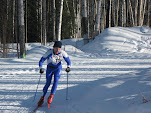Type A or Type B Runner, which are you?
Here is the answer:
You have some Type A features, but are not the 'typical Type A'. You can probably really benefit from the resources below. While your health and happiness aren't as threatened as some, your chances for improvement are that much greater than those with much stronger Type A tendencies. With some lifestyle changes and a few stress relief techniques, you may be in great shape!
Type A I know it when I see it, and I've had my own bouts of it over the years both with running and work. These days, even though I can get impatient and umm well can be a driven competitor, I think I'm trending Type B (a little more on that later).
As a young runner/athlete I started out very much Type B, albeit a somewhat anxious, if not downright anxious Type B. That was about the first two years of my college running career at a small Midwestern college. If I was driven by anything it was fear of failure. And yes, I did fail, flat on my face a few times.
As a freshman and sophomore I got dead last at our conference outdoor meet. Utterly disastrous running, way off my season's best. [in case anyone is curious, I ran 2:15 in the 880 as a freshman, and something like 16:50 for the 3 mile as a sophomore]. Chalk those up nerves and inexperience--especially not knowing about decent pacing early in the race.
But somewhere along the way--primarily after taking a semester off to ski in Colorado--I looked up at the school records and what it took to be all conference and dedication to the sport morphed into obsession. At times unhealthy, fretting about times, splits, workouts, diet and weight, and of course outside approval from peers and coaches, maybe even friends.
I did improve, some. But was consistently inconsistent and was known as more of a workout runner than a meet performer. The highlights of my running for the school was a 9:43 indoor 2 mile at a meaningless early-season meet, and a surprise 4th place finish at our outdoor conference meet in the 3000 m steeplechase.
After stepping away it took a couple years and a reconfigured mindset. No longer was I running to impress anyone, I kept running to see what I could do with it, plus I simply enjoyed getting outside--in whatever conditions--for 60 to 90 minutes a day. Lo! I improved considerably (for example my 5K time got a minute faster) and I became a consistent, and sometimes even prolific, racer.
Those post-college years were fun. I would do the work, and make sure that I got in certain types of training in a reasonable progression, but was not so OCD about it.
That brings us up to today, as a masters runner. I'm competitive as ever, but that's only on race day. A little recognition is nice, but masters running is kind of a funky netherland. I think I've mentioned the that the term elite masters itself is something of an oxymoron, unless you're talking the likes of Kevin Castille running sub 29 min 10K at 40, or Pete Magill doing 15 min 5K at 50, or Joanie Samuelson 2:50 marathon in her mid 50s. There are so very few at the top and the depth is thin.
All that aside, my training and personal training philosophy (i.e, knowing what works for me) is very Type B. I go into a week with a rough idea of how much I'd like to run, but how I do it and what workouts I end up doing totally depends on how I'm feeling. If I'm tired I might take a day off, or run half of what I'd planned--mileage goals be damned--or break it up into a double. Plus I'll cut back on higher intensity workouts, including lactate threshold training if I'm not feeling quite up to par (which happens a lot at 55!).
So I just put a reasonable amount of volume, incorporate threshold or tempo running when I can (say from 20 to 60 minutes a week) and do very little speed or race-specific training other than some pick ups (20 sec) or a few surges of one to two minutes. I let the races themselves take care of specificity.
Interestingly, a number of the athletes that I coach (in fact the majority) are very much Type A. They want to know what they'll do, usually well in advance, how much (as many miles and workouts as they can), and they can fret about pace. We end up with a bit of a trade off. They put up with my idiosyncrasies, I deal with theirs, and it usually works out. I don't care much if they ran 9.3 or 10.4 miles on a given day at 7:45.2 or 9:59 pace. I do get on their case if they run a recovery run or long run too fast, but that's about it. And if they have to stop or modify a workout because it's 95 degrees and 90% humidity, well replenish your electrolytes and don't sweat it. Save the good stuff for race day.


